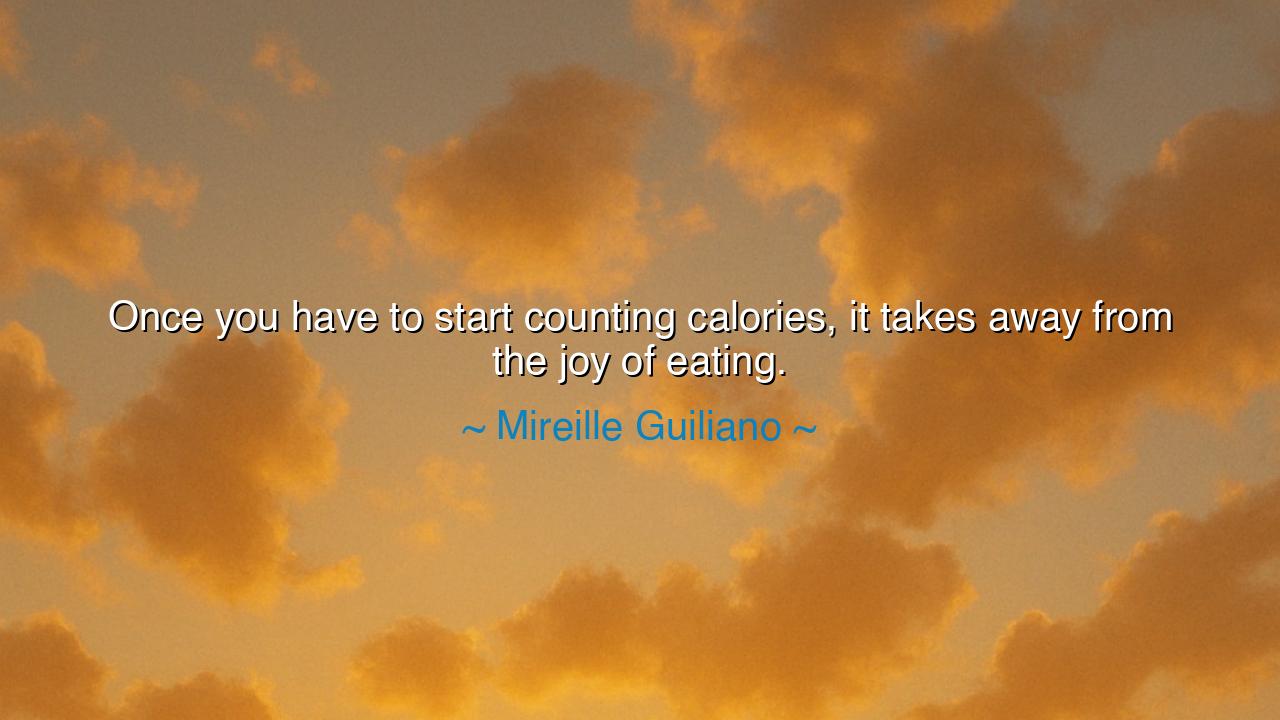
Once you have to start counting calories, it takes away from the






In the depths of life’s journey, there are few joys as universally cherished as the simple act of eating—a practice that nourishes not only the body, but also the soul. Mireille Guiliano wisely observes, "Once you have to start counting calories, it takes away from the joy of eating." These words echo through the ages, offering a profound truth about the balance between enjoyment and discipline. When the sacred act of eating becomes reduced to mere numbers and calculations, we lose touch with its true purpose: to nourish, to connect, and to experience the pleasure that comes from sharing food with those we love, or simply savoring it in solitude.
The ancient Greeks, who revered the balance between body and mind, understood the importance of food as a source of joy and vitality. The philosopher Epicurus, who believed that pleasure was the ultimate goal of life, taught that true pleasure comes not from indulgence, but from moderation and appreciating the simple joys. For Epicurus, food was meant to be savored and shared, not calculated or measured. He believed that the true art of living well lay in enjoying food and drink with awareness, free from the enslavement of rigid rules. Just as Guiliano reflects, the moment we begin to measure every morsel, we lose the essential joy that food can bring.
In the ancient Roman world, the feasts were legendary—not merely for their abundance but for their ability to bring people together in celebration and connection. The philosopher Cicero was known for his appreciation of food as an expression of friendship and good living. He wrote that eating should be a pleasure, a communal act that fosters human connection, not a burden of calculation. The Romans, for all their indulgences, never reduced eating to the mechanical act of counting—there was an art in how they approached meals, a recognition that the pleasures of the table should not be overshadowed by the demands of excess or restriction.
This ancient view of eating, rich in connection and joy, contrasts sharply with the modern obsession with dieting and calorie-counting. Guiliano’s words remind us that when we turn eating into a mathematical equation, we strip it of its humanity. The simple pleasure of tasting food, of feeling gratitude for the meal before us, is eclipsed by the constant monitoring of what goes into our bodies. This disconnection from the pleasure of eating diminishes the richness of our experiences, leaving us obsessed with numbers instead of savoring what is truly nourishing.
Consider the story of Alexander the Great, whose conquests were fueled not just by his military brilliance, but by his love of the simple pleasures in life. When he dined, it was said that he ate heartily but without obsession, understanding that food was necessary for his strength, but not the end goal. His generals would often gather in feasts that emphasized camaraderie and shared moments, not the pursuit of perfection in food or drink. Alexander knew that the joy of eating was not about measuring or limiting, but about enjoying life’s simple pleasures with those who accompanied him on his journey.
The lesson in Guiliano’s words is clear: we must reclaim the joy of eating by returning to the natural balance between nourishment and enjoyment. Food should not be reduced to calories and restrictions but celebrated as part of life’s pleasure and vitality. The true art of eating, as the ancients taught, lies in moderation—in knowing when to indulge and when to abstain, but always with an appreciation for the moment, the flavors, and the experience of being nourished. Savor your food, not with the mindset of a strict diet, but with a heart full of gratitude and an awareness of the pleasure it brings.
So, let us heed the wisdom of Guiliano and the ancients alike. Let us eat not as prisoners of numbers and restrictions but as beings worthy of experiencing the joy that food offers. Let the table be a place of connection, not just to the food, but to each other and to the deeper parts of ourselves. Let each meal be a reminder that the true wealth of life is found not in what we restrict, but in what we embrace—the fullness of life, the pleasures of the senses, and the balance that nourishes both body and soul.






AAdministratorAdministrator
Welcome, honored guests. Please leave a comment, we will respond soon